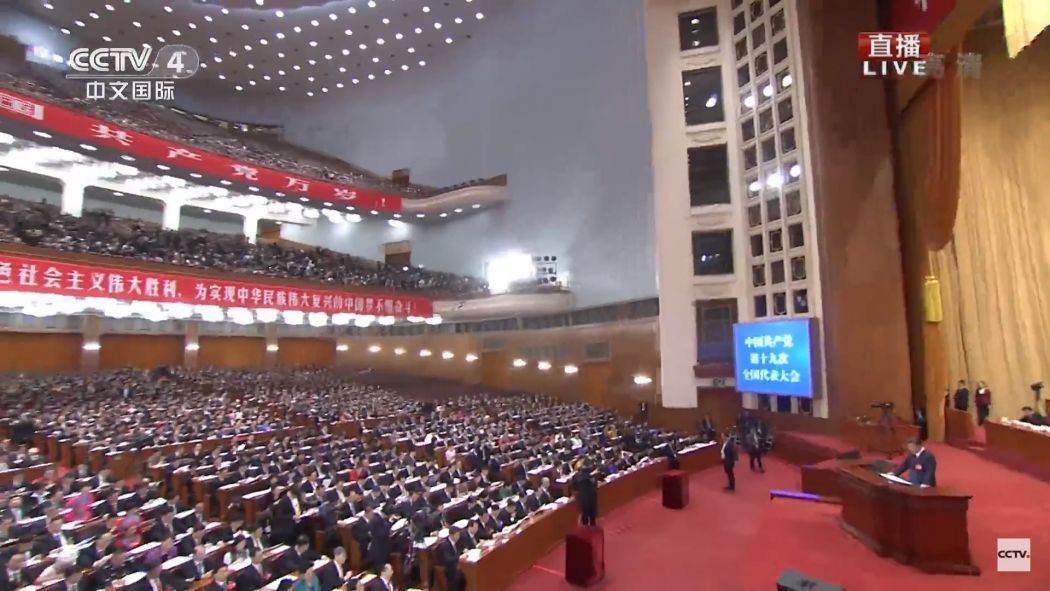Chinese Xi Jinping says that the central government exercises full control over Hong Kong and Macau. He was speaking at the opening of the 19th Chinese Communist Party National Congress on Wednesday, though did not make direct reference to the Hong Kong independence movement.
“We have made new progress in work related to Hong Kong, Macau and Taiwan. We have fully and faithfully implemented the principle of ‘One Country, Two Systems’ and ensured that the central government exercises its overall jurisdiction over Hong Kong and Macau as mandated by the Chinese constitution and the Basic Law of the two Special Administrative Regions,” Xi said.

“We have boosted exchanges and cooperation between the mainland and the regions and maintained prosperity and stability in Hong Kong and Macau.”
Xi did not mention some key phrases which appeared in former leader Hu Jintao’s party congress opening speech in 2012, including “respect the differences of the two systems.”
Xi said on Wednesday: “Maintaining lasting prosperity and stability in Hong Kong and Macau and achieving China’s full reunification are essential to realising national rejuvenation… We should ensure the principle of ‘One Country, Two Systems’ remain unchanged, is unswervingly upheld, and in practice, is not bend or distorted.”

Xi said “One Country, Two Systems” has proven to be the best solution to handle Hong Kong and Macau’s historical issues.
“To maintain long term prosperity and stability in Hong Kong and Macau, it is imperative to fully and faithfully implement the ‘One Country, Two Systems,’ the people of Hong Kong governing Hong Kong, the people of Macau governing Macau, and a high degree of autonomy,” he said.
He said the central government will continue supporting administrations of Hong Kong and Macau in promoting development and harmony, ensuring people’s wellbeing, taking “well ordered steps” to advance democracy, and “maintaining law and order to fulfilling the constitutional responsibility of safeguarding China’s sovereignty and security and development interests.”
Xi added that Hong Kong and Macau’s developments are closely tied to the mainland and Beijing supports the integration into the “Greater Bay Area,” and the Pan-Pearl River Delta Regional Co-operation.
“We will remain committed to the policy of the Hong Kong people to govern Hong Kong, Macau people to govern Macau, with patriots playing the principal role… and foster patriotism and stronger sense of national identity among people in Hong Kong and Macau. With this, our compatriots in Hong Kong and Macau will share both responsibility of national rejuvenation and the pride of a strong and prosperous China.”

Former chief executive Tung Chee-hwa and Leung Chun-ying, both vice-chairs of the Chinese People’s Political Consultative Conference, attended the opening. Former Macau chief executive Edmund Ho was also present
On Taiwan, Xi said Beijing had upheld the One China principle and the 1992 consensus, promoted peaceful development of cross-strait relations, strengthened cultural, economic exchanges and cooperation, held historic meeting between leaders of the two sides.

“We have responded appropriately to the political development in Taiwan, resolutely opposed and deterred separatist elements advocating Taiwan independence, and rigorously safeguarded peace and safety in Taiwan straits,” he said.
Without mentioning the Hong Kong independence movement, Xi said: “Any separatist activity is certain to meet with the resolute opposition of the Chinese people. We have the resolve, the confidence, and the ability to defeat separatist attempts for Taiwan independence in any form.”
“We will never allow anyone, any organisation, or any political party, at anytime, or in any form, to separate any part of Chinese territory from China.”
Hong Kong is in the midst of a debate over the legality of advocating for the city’s independence. The authorities have also cracked down upon pro-democracy activists in recent months, with several organisers of the 2014 Umbrella Movement jailed. During her election campaign, Chief Executive Carrie Lam pledged to enact the controversial national security law, Article 23, and has said a law criminalising insults against the Chinese national anthem will be legislated upon in the city.
